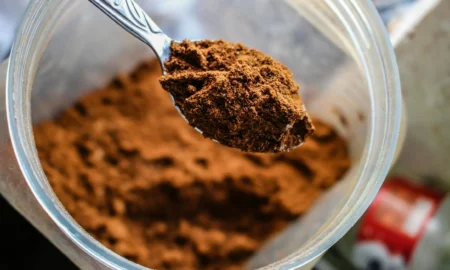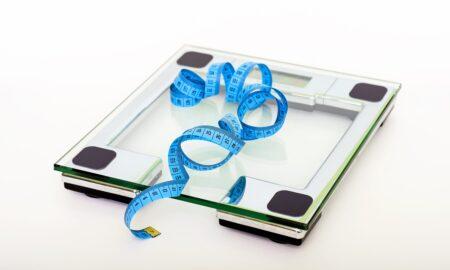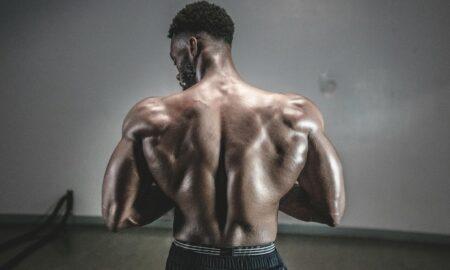Robert couldn’t understand why losing bodyfat was such a battle for him. He used a sensible bodybuilding program, training four to five days a week, rarely missing workouts. Besides his usual one-hour weight routine, Robert did aerobics after his weight session for at least 30 to 45 minutes at a pace corresponding to his target zone for maximum fat oxidation, based on his age. He followed a moderate-carb, high-protein diet that had at least 20 percent of calories coming from ‘good fats,’ such as omega-3s from fish or flaxseed oil. Still, he didn’t have the razor-sharp muscular definition that’s the hallmark of a successful bodybuilding competitor.
There was a reason for Robert’s apparent inability to reach a maximally defined muscular condition, and he was totally unaware of it. At night, usually after he fell asleep, Robert would raid his refrigerator, eating whatever he could get into his mouth. The discipline he had during the daylight hours changed into ugly gluttony when the sun went down. Three a.m. would usually find him stuffing his face with anything imaginable, including an entire jar of peanut butter, week-old leftover pizza’even ice cream. Then he’d return to bed, seemingly unaware of the havoc wreaked on his efforts to get cut.
The only hint that something was amiss with Robert was the glazed, almost hypnotic look on his face. Indeed, if you’d encountered Robert during his nocturnal eating raid and shaken him, he’d have awakened with a start. Robert, you see, was ‘sleepeating.’ In medical parlance that’s a nocturnal sleep-related eating disorder. The 1.5 million people who experience it literally eat in their sleep, having no idea what they’re doing. The precise cause of the disorder isn’t clear. Some scientists think it may be the result of a highly stressful event or a long-standing emotional disorder. Others think that sleepeaters experience a sudden drop in blood glucose, or hypoglycemia, and somehow find their way to the fridge to relieve the problem. Since they aren’t awake, there’s no brake on their food intake. Put a dead rat in the freezer, and they may think it’s leftover roast beef.
The nocturnal eating disorder is an extreme version of night eating. Most people are only too conscious of what they’re eating in the late evening, wide awake and fully aware of their after-hours gluttony. But is night eating that bad? After all, a calorie is a calorie is a calorie, and when you eat them shouldn’t make much difference in the overall pattern of fat loss, provided your activity level is sufficient to burn all the calories you take in throughout the day.
Indeed, that’s what one study showed several years ago. It began with the premise that eating at night tends to perpetuate fat storage, since most people are less active during the evening and calories consumed at that time have less chance of being oxidized through some type of physical activity. Most bodybuilders also believe that and curtail heavy eating during the evening.
But after carefully measuring bodyfat levels, calorie intake and activity levels during the day and night, the study concluded that it makes little difference when you take in your calories, provided that your total daily intake doesn’t exceed your activity level. That conclusion clearly differs from conventional wisdom on the subject.
On the other hand, it’s also a fact that the human body functions according to a circadian rhythm, which comes down to the fact that body chemistry changes dramatically during any 24-hour period. The changes involve various metabolic reactions, including those influenced by hormones’testosterone, for example. In men testosterone peaks about eight a.m. and reaches a nadir, or low point, during the early evening hours.
Since hormones and various body chemicals follow a distinct circadian pattern and interact with food intake, when you eat should make a difference. The fate of certain nutrients varies depending on what time you eat them. Studies also show that the body better absorbs drugs at certain times of day; aspirin is best taken during the early morning hours.
The human body has evolved to expect the bulk of daily energy expenditure to occur during the day, and it’s primed to produce maximum energy during the day. The night is for rest, during which the body winds down. The question is, What happens when you go against the biological grain by eating or training late at night?
The Shift-Working Experience
If anything assaults natural body rhythms, it’s night-shift work. Working the length of the night and sleeping during the day is the converse of what the body is used to. Numerous studies show that those who by necessity must work late at night experience increased incidence of obesity and cardiovascular disease. Other studies show that subjects respond differently to a meal, depending on whether they eat early in the day or later at night. The difference is literally night and day. ALL There are various mechanisms behind the dramatic differences in the way the body handles food. For example, gastric emptying rate, or how fast food leaves the stomach, shows a circadian rhythm, being more rapid during the day. More efficient hormone and enzyme processes are geared for greater daytime activity. The same is true of intestinal blood flow and kidney and liver function. Glucose tolerance, or the way your body handles sugars and carbs in general, declines with the passing hours, which implies that you have a greater chance of getting fatter from eating carbs later in the day.
Getting the largest portion of daily calories at night produces an unfavorable blood lipid profile. What happens here is that low-density-lipoprotein cholesterol (LDL) goes up, while protective high-density-lipoprotein cholesterol (HDL) declines. That’s significant because higher levels of LDL are tied to increased cardiovascular disease, such as heart attacks and strokes. HDL works in reverse; it carts out excess cholesterol from the blood, preventing both the oxidation of cholesterol and the clinging of fat and cholesterol to arterial walls. I suspect the cardiovascular effects of eating at night are part of an overall stress reaction to going against the body’s natural chemical rhythms.
A recent study examined night eating in seven male night-shift workers, aged 23 to 43, to shed light on hormonal changes that may occur from eating at night.1 The subjects went on two different diets, both containing the same number of calories but with different fat and carbohydrate ratios. The high-carb diet (HC) derived 65 percent of calories from carbs and 20 percent from fat. The high-fat diet (HF) featured 40 percent carbs and 45 percent fat. Participants ate every four hours during a 24-hour period, while locked in a metabolic ward’ostensibly so they couldn’t sneak in any snacks.
The researchers found definite hormonal variations depending on what time the food was eaten. Cortisol, an adrenal hormone well known to bodybuilders as the body’s major catabolic hormone, declined following meals at 8 a.m., 12 p.m. and 4 a.m. Yet no change occurred in cortisol after meals at 4 p.m., 8 p.m. and midnight. Measurements of pancreatic polypeptide, a hormone used to access the activity of the gastrointestinal tract, showed the greatest activity during the day, declining after 8 p.m. In short, food absorption is more efficient during the day. The subjects on the high-carb meals showed lower glucagon levels and a lower level of reverse T3, an inactive form of thyroid hormone. Lower levels of glucagon would be expected on a higher carb intake, since glucagon acts primarily to promote a process called gluconeogenesis in the liver, resulting in higher blood glucose levels.
Another study by the same researchers featured both high-fat and high-carb diets provided at different times throughout the day and night.2 In subjects on a higher fat diet, fat oxidation was at its lowest point between 8 a.m. and 12 p.m., plateauing between 12 noon and 8 a.m. Glucose oxidation increased during the morning hours. The lower fat burning and higher glucose usage most likely stemmed from an increase of gluconeogenesis in the liver due to an overnight fast featured in this study. Levels of both glucose and triglycerides, or blood fat, increased toward the evening hours.
The researchers also found that the body can buffer the effect of different meal sizes. Eating higher carbs at night appears to lead to higher blood triglyceride levels, lower energy expenditure, increased irritability and a greater level of sleepiness than a higher-fat, lower-carb intake during the evening.
Another study appears to confirm the oft-repeated advice to eat the bulk of daily calories during the day.3 It examined the dietary intake of 375 men and 492 women for one week, including precisely when they ate. Analysis of their food diaries showed that those who ate most of their food earlier in the day took in fewer calories over the course of the day than those who ate most of their food later in the day or at night.
The authors noted that eating late doesn’t satisfy the body or suppress the appetite as much as eating earlier does. There’s a tendency to eat more when you eat most of your food later in the day or at night. That may relate to evolutionary mechanisms, since early man ate mostly during the day, reserving the evening hours for rest.
Another reason to consider curtailing heavy food intake at night is that not doing so leads to insulin resistance. What happens here is that the body begins to secrete greater amounts of insulin following a meal, especially if that meal is eaten late at night. Most bodybuilders realize that while insulin is a major anabolic hormone, it’s also the body’s greatest fat-promoting hormone. So calories taken in at night do have a greater chance of being stored as fat, unless they’re burned during physical activity. Even going without sleep or having poor sleep habits is known to cause insulin resistance, as well as lowered testosterone levels and higher cortisol levels. The question remains: What should you eat at night if you have an urge for sustenance? From a bodybuilding standpoint, the answer is clear: protein. Protein has been shown to provide a potent appetite-suppression effect and does not promote the huge insulin release that carbohydrates do. In addition, protein eaten at night provides the amino acids that blunt the catabolic effects of cortisol, which peaks during the late-night hours. [Editor’s note: See the IRON MAN Research Team on page 94 for more on protein, as well as a special price on two quality protein supplements.] For some, however, certain amino acids can cause insomnia. In such cases it’s best to eat your final meal about four hours before retiring. One thing you should avoid is any type of essential fatty acid supplement, such as fish oils or flaxseed oil, before sleep. While they’re useful, taking them before bed will suppress the activity of chemicals that help induce sleep.
Editor’s note: For more fat-burning tips, diets and workouts, see the new Fat to Muscle 2, available from Home Gym Warehouse for $9.95 plus shipping and handling. To order call 1-800-447-0008 or visit www.home-gym.com.
References
1 Holmback, U., et al. (2003). Endocrine responses to nocturnal eating’possible implications for night work. Eur J Nutr. 42:75-83.
2 Holmback, U., et al. (2002). Metabolic responses to nocturnal eating in men are affected by sources of dietary energy. J Nutr. 132:1892-1899.
3 De Castro, J. (2004). The time of day of food intake influences overall intake in humans. J Nutr. 134:104-111. IM
EAT MORE, BURN FAT
Many people think that if they drop a meal from their daily eating, they’ll lose fat. Not true, in most cases, and insulin is the reason. It’s also the reason the common three-square-meals-a-day plan can stall the fat-burning and muscle-building processes. Here’s what happens:
‘At 7 a.m. you eat a big breakfast and trigger insulin so that excess carbs and fat are stored as bodyfat; the rest increase your blood sugar to fuel activity and prevent fat burning for a few hours. (If you skip breakfast, you begin burning muscle immediately.)
‘Three hours later’at 10 a.m.’insulin has done its job and your blood sugar is low. The starvation mechanism kicks in, and you start burning muscle for energy as your body conserves fat.
‘At noon you eat a big lunch, trigger another insulin surge, blunt fat burning and store bodyfat’the same scenario as at breakfast.
‘Three hours later’at 3 p.m.’the starvation mechanism kicks in again, and you burn more muscle and conserve bodyfat.
‘At 7 p.m. you eat a big dinner, trigger an insulin surge, blunt fat burning and store more bodyfat.
‘At 9:30 p.m. the starvation mechanism rears its ugly head, and you either burn more muscle or binge and feed your fat cells.
Obviously, eating three big meals a day isn’t conducive to burning bodyfat’and one big meal a day is even worse, as your body burns muscle and hoards bodyfat most of the day in an attempt to cope with what it perceives as starvation signals.
Having five to six smaller meals a day, on the other hand, ensures that your system always has the elements it needs readily available for the muscle-building process to occur. It also keeps your blood sugar stable to prevent cravings and holds insulin at bay so there’s no fat storage.
‘Steve Holman, Fat to Muscle 2 RIPPING TIP 1
Increase your protein and reduce your carbs’but not too much. It takes more energy to digest protein, and that burns extra calories. Therefore, increasing your protein intake at the expense of carbs will be like a calorie reduction’just be sure to get plenty of fiber. In fact, research indicates that a high-protein meal boosts postmeal thermic activity by 100 percent over what you get with a high-carb meal (Am Col Nutr, 21(1):55-61; 2002). Oh, and you get another metabolic boost as higher-protein diets help maintain thyroid hormone, so your metabolism stays stoked, converting bodyfat to energy (J Nutr, 133:411-417; 2003). Nevertheless, you shouldn’t reduce carbs to fewer than 100 grams per day for health reasons (fruits and vegetables have phytonutrients necessary for disease prevention).
RIPPING TIP 2
Go for the burn in the gym. Research shows that lactic acid, which produces that burning feeling during a set, changes the pH of the blood and encourages growth hormone release (Can J of Appl Phys, 22:244-255; 1997). GH is notorious for melting bodyfat. One reason is its effect on thyroid hormones. Studies show that GH increases the conversion of the relatively inactive T4 into the far more metabolically active T3 in peripheral tissues, or organs outside the thyroid gland, such as the liver. Optimal thyroid release also helps optimize testosterone synthesis, and that means faster muscle growth.
RIPPING TIP 3
Get most of your carb allotment in the morning, eating mostly protein foods in the afternoon and evening. You’ll keep your bloodstream free of an excess of sugar, the fuel source from carbohydrates that stops you from burning bodyfat for energy, later in the day. That forces the use of fat for energy’if your calorie intake is low enough.
A recent study showed that men who ate at least five meals a day had an average body-mass index 13 percent lower than that of those who ate only one or two meals a day. The frequent eaters also had a 4 percent lower waist-to-hip ratio, which indicates less bodyfat (Int J Obesity, 26:1476-1483; 2002). As for skipping breakfast, here’s why it’s a bad idea: In 1993 researchers at the University of Colorado and the University of Pittsburgh studied people who’d lost 30 pounds or more and kept it off for at least one year. They were looking for clues as to what helps people reduce bodyfat permanently. One thing they found was that four out of five ate breakfast every day of the week. If you don’t eat breakfast, your body starts burning muscle immediately and hangs onto bodyfat.
RIPPING TIP 5
Get enough sleep. If you don’t get enough sleep, you make it more difficult to lose bodyfat. In a study done at the University of Chicago, men who got only about four hours of sleep a night showed lowered levels of leptin, a hormone that signals your body that it’s had enough food. The leptin levels of many of the subjects, who were all well-nourished, were similar to those of underfed people. That may explain why other studies have shown that sleep-deprived people crave starchy and sugary carbohydrates’their leptin levels are low, which tricks their bodies into thinking they need more food.
RIPPING TIP 6
Include more fat in your diet. That’s right, fat’especially the so-called good kind, essential fatty acids found in nuts and fish. Studies show that diets in which less than 20 percent of total calories comes from fat can cause a decrease in testosterone’and testosterone not only helps you build muscle but also helps you burn bodyfat, especially in the abdominal area. Don’t associate dietary fat with bodyfat. In fact, diets rich in omega-3 fats not only don’t promote bodyfat accumulation but may protect against obesity as well. Omega-3s are known to change the characteristics of cellular membranes in a way that favors increased insulin receptor effectiveness. In other words, they help prevent excess fat gain.
Editor’s note: Fat to Muscle 2 is available from Home Gym Warehouse for $9.95 plus shipping and handling. Call 1-800-447-0008 or visit www.home-gym.com.




















You must be logged in to post a comment Login